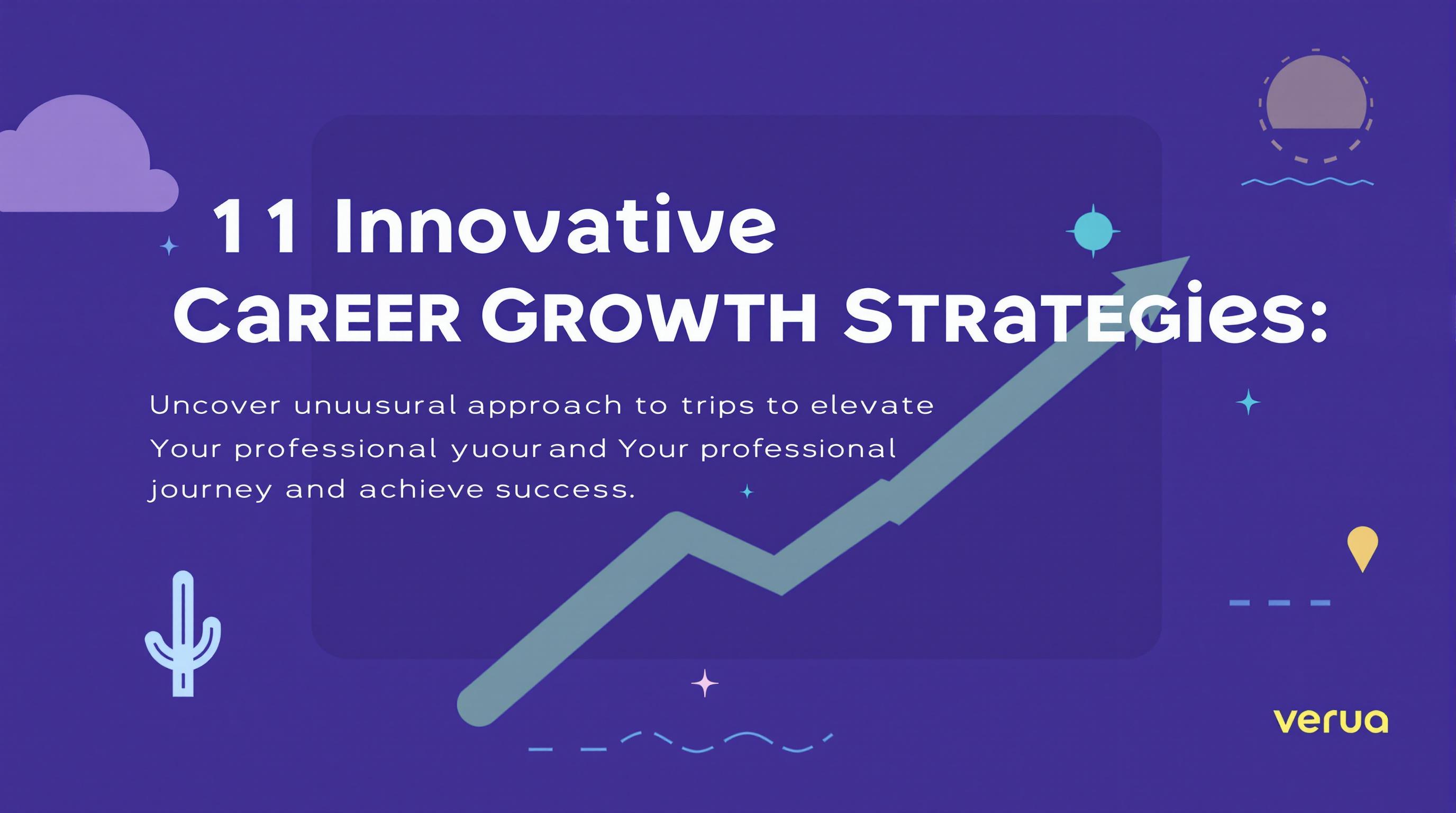Related Articles
- Navigating the Talent Labyrinth: How Emotional Intelligence Is Shaping New Hiring Practices in Unseen Markets
- Behind the Scenes: How Automating HR Processes Is Redefining the Future of Recruitment and Job-Seeking Strategies
- Beneath the Surface: Unveiling the Surprising Role of Environmental Sustainability in Shaping Future Careers
- Exploring the Quirky Side of Remote Work: How Hobbies Are Fueling Professional Success in Unexpected Ways
- How the Remote Revolution is Inspiring Unlikely Friendships Across Continents: A Study of Global Connectedness
- The Unforeseen Bond: How Virtual Coworking Spaces Foster Unexpected Connections Amidst Remote Work
7 Unconventional Career Growth Approaches: Explore Unseen Pathways to Elevate Your Professional Trajectory and Influence
7 Unconventional Career Growth Approaches: Explore Unseen Pathways to Elevate Your Professional Trajectory and Influence
7 Unconventional Career Growth Approaches: Explore Unseen Pathways to Elevate Your Professional Trajectory and Influence
1. Embrace the Power of Mindfulness
In today’s fast-paced world, the act of pausing to reflect and breathe is often overlooked. Mindfulness—a pathway that enhances focus and clarity—becomes a crucial tool for career advancement. By integrating mindfulness practices into your daily routine, you cultivate a greater awareness of your strengths and weaknesses, enabling insightful decisions about your career direction.
Investigate your professional landscape with a calm mind. Journaling your thoughts during meditative practices can reveal underlying passions that may have been obscured by the noise of corporate life. This introspection fosters authenticity, allowing you to align your career with your true self.
Moreover, mindfulness promotes emotional intelligence, a skill highly valued in leadership. According to a study by the Harvard Business Review, leaders who practice mindfulness exhibit higher levels of empathy and better decision-making skills. Make this practice a staple in your journey of self-discovery and professional growth.
2. Cultivate a Personal Board of Advisors
Much like a company benefits from its board of directors, you too can find guidance through a personal board of advisors. This unique assembly of mentors, peers, and industry experts can provide diverse perspectives and insights that shape your career trajectory. It’s about building a network that supports your goals and encourages growth.
Choose advisors from various backgrounds—those who challenge you, inspire you, and help you confront blind spots. Regular check-ins can foster a sense of accountability while broadening your professional horizons. Their knowledge can lead you to opportunities that you may have not considered otherwise.
According to a report by the American Society for Training & Development, individuals with mentors are five times more likely to be promoted. Your personal board can bridge the gap between where you are and where you aspire to be, guiding you along uncharted paths of success.
3. Experiment with Side Projects
Side projects are often dismissed as mere hobbies, yet they can be potent catalysts for professional development. They provide a platform to explore new interests or refine your skills without the constraints of conventional workplace structures. Embracing these projects pushes you out of your comfort zone, often leading to unique insights that can influence your primary career.
Moreover, side projects can showcase your initiative and creativity to potential employers. They demonstrate a commitment to continuous learning and evolution, traits highly sought after in today’s dynamic job market. Enthusiastically sharing your side endeavors can even open doors to collaborations or speaking opportunities.
As the author Tim Ferriss states, “Focus on being productive instead of busy.” It’s through these unconventional avenues that you might stumble upon your next significant career breakthrough while enjoying the journey of exploration along the way.
4. Leverage Online Learning Platforms
In an age dominated by technology, online learning platforms have revolutionized how knowledge is disseminated. Diversifying your skill set through platforms like Coursera, Udacity, or LinkedIn Learning allows you to tailor your education to specific career needs. This personalized approach enables you to acquire competencies that directly correlate with your professional aspirations.
The beauty of these platforms lies in their flexibility—they allow you to learn at your own pace, making personal growth manageable alongside work commitments. Consider pursuing certifications or courses that align with industry trends, providing a significant advantage in competitive job markets.
Data from the World Economic Forum indicates that 94% of employees say they would stay at a company longer if it invested in their career development. Embracing continuous learning signifies to employers that you are proactive about your professional journey, enhancing your value in the workplace.
5. Network Authentically
Networking often conjures images of stuffy events and superficial conversations, yet authentic networking can be transformative. Cultivating genuine relationships with colleagues, peers, and industry professionals opens pathways that mere transactional interactions cannot. Seek to connect with others on a human level, exploring shared interests and mutual values.
Participating in community events or volunteer opportunities related to your field can enhance authentic connections, allowing you to engage in meaningful dialogue. This form of networking fosters trust and integrity, paving the way for future collaborations or referrals.
As stated in a report by Forbes, 85% of all jobs are filled through networking. Thus, shedding the traditional networking mindset and focusing on building real connections can lead to unexpected opportunities that propel your career forward.
6. Reframe Failure as a Stepping Stone
In our quest for success, failures are often seen as setbacks; however, reframing these experiences can lead to profound growth. Understanding that each failure comes with valuable lessons paves the way for resilience and adaptability. Embrace missteps as critical components of your journey, allowing them to refine your perspective and skills.
Taking calculated risks in your career can breed innovation. A survey conducted by the Harvard Business Review reveals that companies that encourage risk-taking outperform their competitors. By adopting a mindset that views failure as an opportunity rather than a defeat, you foster an environment conducive to creativity and growth.
Learn to analyze your failures constructively, asking questions that promote growth. What did this teach you? How can you apply this knowledge moving forward? Such reflections nurture a robust professional identity marked by perseverance and self-awareness.
7. Prioritize Work-Life Integration
Work-life balance has evolved, and the idea of work-life integration offers a refreshing perspective. By harmonizing personal and professional commitments, you find your optimal productivity and satisfaction. This approach allows you to align your work with your life’s priorities rather than viewing them as separate entities.
Creating time for passions, hobbies, and family enhances your overall well-being, positively impacting your professional output. When you prioritize self-care and personal fulfillment, job satisfaction tends to rise, leading to increased motivation and performance.
Ultimately, an integrated approach fosters creativity and fuels passion. The International Labour Organization indicates that work-life balance mitigates stress and enhances productivity, making it a powerful tool in your career growth arsenal. Embrace the art of integration, and let it lead you toward a fulfilling professional journey.
Conclusion
The professional landscape is continuously evolving, and embracing unconventional pathways offers unique opportunities for growth. From practicing mindfulness to reframing failure, these approaches enable you to elevate your professional trajectory in ways that traditional methods may overlook. As we journey forward in our careers, let us not forget the unseen pathways that await discovery.
Remember, career growth is not solely about climbing the corporate ladder; it is a holistic experience deeply intertwined with personal development. By adopting these seven unconventional approaches, you engage in a transformative process that fosters both professional success and inner fulfillment.
Embrace the journey, for in the exploration of these paths lies the potential for profound impact—not just in your own life but in the lives of others around you.




